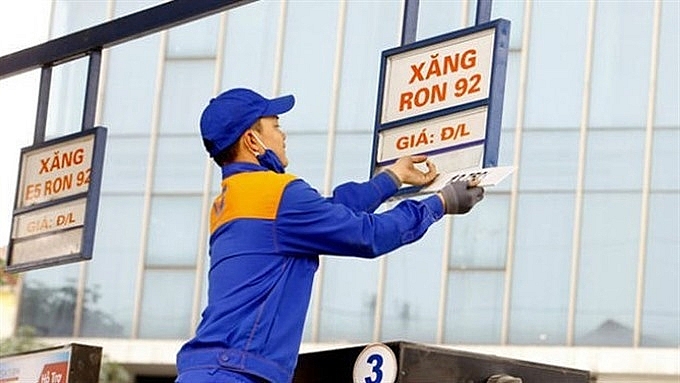Fuel prices set to put pressure on inflation
 |
| Experts have warned fuel price hikes will put pressure on inflation next year.- Photo vneconomy.vn |
Nguyen Duc Thanh, VEPR’s director said at the launching of the report about the Vietnamese macro-economy in Hanoi yesterday that inflation in 2019 would exceed the 4 per cent target set in recent years.
“The Government should have strong measures to control inflation next year,” Thanh said.
With environmental protection taxes on petroleum to be raised from VND3,000 to VND4,000 per litre from next year, VEPR estimated this increase might push up inflation by 1.6 percentage points within 12 months.
“The pressure on inflation next year requires the State Bank of Vietnam to be cautious with money supply and credit policies,” Thanh added.
Previously, the National Assembly Finance and Budget Committee, however, estimated that tax hikes on petroleum would push up CPI in 2019 by 0.07-0.09 per cent.
For inflation this year, Thanh said: “The Government’s target of keeping inflation under 4 per cent this year is within reach if there are no big fuel price shocks in the quarter.”
VEPR projected inflation to be at 4.25 per cent in the last quarter of this year.
Deputy Prime Minister Vuong Dinh Hue at a meeting of the Price Management Steering Committee at the end of September asked efforts to keep inflation at 3.7-3.95 per cent in 2018, urging close watch on global prices updates, especially oil prices and the impacts of unpredictable weather.
Hue also asked relevant ministries to plan for 2019 with the goal of controlling inflation at around 4 per cent.
The National Financial and Monetary Policy Advisory Council proposed that the inflation target should be set at around 4 per cent in 2019 rather than below 4 per cent.
Thanh said economic growth will be impressive, adding that VEPR predict it to be at 6.85 per cent for 2018, far exceeding the National Assembly’s target at 6.5-6.7 per cent.
“However, in the context of escalating trade war and rising protectionism, the Vietnamese economy might face uncertainty from shocks in the global markets,” he said.
The Fed’s interest rate hikes would create pressure on the domestic currency and exchange rates, he said. While, the use of foreign currency reserve to stability exchange rates was only short-term and might bring risks, given the thin reserve of Vietnam, Thanh said.
“The US - China trade war is an opportunity for Vietnam to speed up reform and enhance resilience against global risks, including reducing budget deficit, increasing trust surplus, improving business climate and simplifying administrative procedures,” Thanh said.
What the stars mean:
★ Poor ★ ★ Promising ★★★ Good ★★★★ Very good ★★★★★ Exceptional
Related Contents
Latest News
More News
- Citi economists project robust Vietnam economic growth in 2026 (February 14, 2026 | 18:00)
- Sustaining high growth must be balanced in stable manner (February 14, 2026 | 09:00)
- From 5G to 6G: how AI is shaping Vietnam’s path to digital leadership (February 13, 2026 | 10:59)
- Cooperation must align with Vietnam’s long-term ambitions (February 13, 2026 | 09:00)
- Need-to-know aspects ahead of AI law (February 13, 2026 | 08:00)
- Legalities to early operations for Vietnam’s IFC (February 11, 2026 | 12:17)
- Foreign-language trademarks gain traction in Vietnam (February 06, 2026 | 09:26)
- Offshore structuring and the Singapore holding route (February 02, 2026 | 10:39)
- Vietnam enters new development era: Russian scholar (January 25, 2026 | 10:08)
- 14th National Party Congress marks new era, expands Vietnam’s global role: Australian scholar (January 25, 2026 | 09:54)

 Tag:
Tag:



















 Mobile Version
Mobile Version